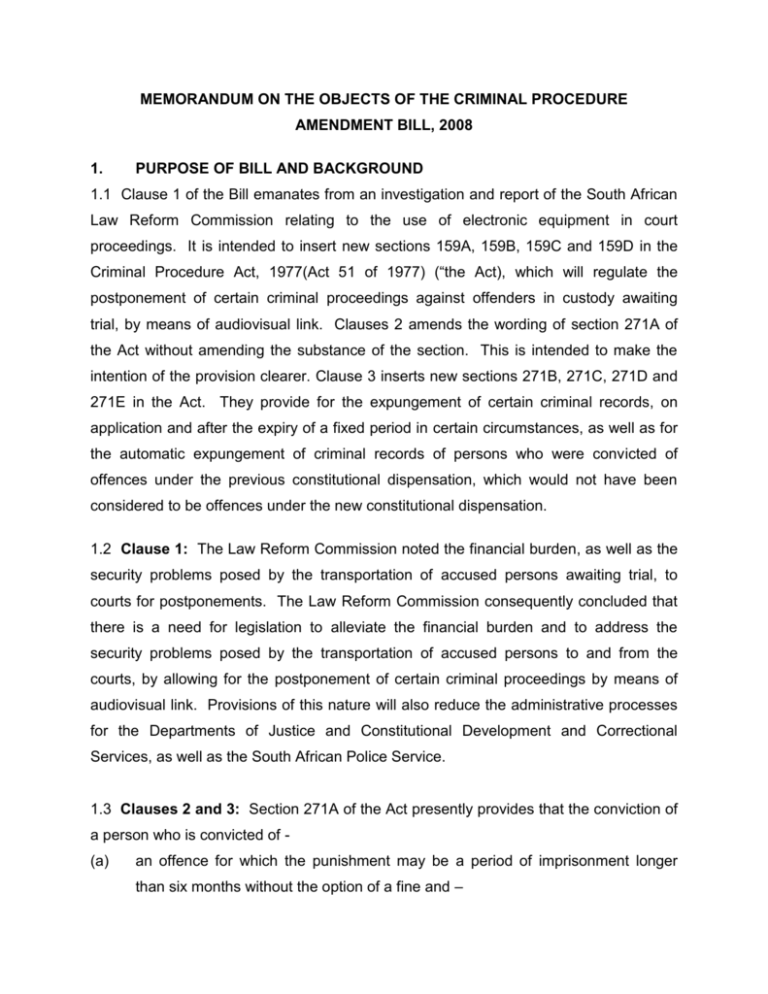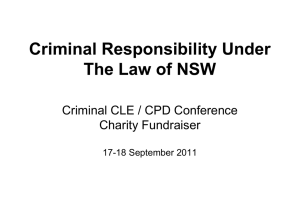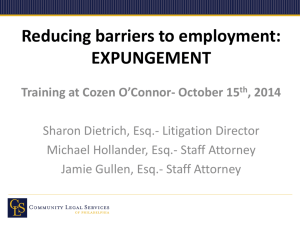DEPARTMENT OF JUSTICE AND CONSTITUTIONAL
advertisement

MEMORANDUM ON THE OBJECTS OF THE CRIMINAL PROCEDURE AMENDMENT BILL, 2008 1. PURPOSE OF BILL AND BACKGROUND 1.1 Clause 1 of the Bill emanates from an investigation and report of the South African Law Reform Commission relating to the use of electronic equipment in court proceedings. It is intended to insert new sections 159A, 159B, 159C and 159D in the Criminal Procedure Act, 1977(Act 51 of 1977) (“the Act), which will regulate the postponement of certain criminal proceedings against offenders in custody awaiting trial, by means of audiovisual link. Clauses 2 amends the wording of section 271A of the Act without amending the substance of the section. This is intended to make the intention of the provision clearer. Clause 3 inserts new sections 271B, 271C, 271D and 271E in the Act. They provide for the expungement of certain criminal records, on application and after the expiry of a fixed period in certain circumstances, as well as for the automatic expungement of criminal records of persons who were convicted of offences under the previous constitutional dispensation, which would not have been considered to be offences under the new constitutional dispensation. 1.2 Clause 1: The Law Reform Commission noted the financial burden, as well as the security problems posed by the transportation of accused persons awaiting trial, to courts for postponements. The Law Reform Commission consequently concluded that there is a need for legislation to alleviate the financial burden and to address the security problems posed by the transportation of accused persons to and from the courts, by allowing for the postponement of certain criminal proceedings by means of audiovisual link. Provisions of this nature will also reduce the administrative processes for the Departments of Justice and Constitutional Development and Correctional Services, as well as the South African Police Service. 1.3 Clauses 2 and 3: Section 271A of the Act presently provides that the conviction of a person who is convicted of (a) an offence for which the punishment may be a period of imprisonment longer than six months without the option of a fine and – 2 (i) the passing of sentence has been postponed in terms of section 297(1)(a) of the Act and the person has been discharged in terms of section 297(2) of the Act without the sentence being passed or the person has not been called to appear before the court in terms of section 297(3) of the Act; or (ii) the person has been discharged with a caution or reprimand in terms of section 297(1)(c) of the Act; or (b) any other offence than that for which the punishment may be a period of imprisonment longer than six months without the option of a fine, falls away as a previous conviction, after a period of 10 years has lapsed, unless the person is convicted, during that 10 year period, of an offence for which the punishment may be a period of imprisonment exceeding six months without the option of a fine. The automatic lapsing of previous convictions in terms of this provision, however, does not result in the automatic expungement of the conviction and sentence from the person’s criminal record. The lapsing of the criminal record also does not lead to the removal of the previous convictions from the criminal records of persons previously convicted. The records of deceased persons and those relating to decriminalised offences remain stored on the system of the Criminal Record Centre of the South African Police Service. 2. OBJECTS OF THE BILL 2.1 Clause 1: 2.1.1 Proposed new section 159(A)(1) contains self-explanatory definitions. 2.1.2 Proposed new section 159A(2) sets out the circumstances in which an accused person’s case may be postponed by means of audiovisual link. It provides that any accused person who is over the age of 18 years, who is in custody in a correctional facility in respect of an offence and who has already appeared in court, whose case has been postponed and who is in custody pending his or her trial and who is required to be brought before a court for the purpose of certain “subsequent proceedings”, is not required to appear or be brought physically before the court and may appear before the court by means of audiovisual link, unless the court directs that he or she appear or be brought physically before the court. Proceedings conducted by means of audiovisual link are deemed to have been conducted in the presence of the accused person if the 3 accused person is able to follow the court proceedings and the court is able to see and hear the accused person, by means of audiovisual link. (Proposed new section 159A(3)) The remote point where the accused person appears is deemed to be part of the court. (Proposed new section 159A(4)). 2.1.3 Proposed new section 159B(1) provides that the technical requirements set out in proposed new section 159C, and proposed new section 159B(2) and (3), must be complied with for an accused person to appear before a court by means of audiovisual link. Proposed new section 159B (2) empowers the Minister to designate any correctional facility that has been suitably equipped, as a place where audiovisual “conferencing” may take place. Proposed section 159B (3) deals with private communications and the transmission of documents between the accused person and his or her legal representative where the legal representative is not present with the accused person at the remote point. In terms of proposed new section 159D, communication by means of audiovisual link is confidential between the accused person and his or her legal representative, and is inadmissible as evidence. Proposed section 159B(4) provides that the court must, at every appearance of an accused person in terms of section 159A, inquire into the physical and mental well-being of the accused person and for that purpose may, where necessary, direct that the audiovisual facilities be used in such a manner which will enable the presiding officer to satisfy himself or herself as to the accused person’s well-being as that presiding officer would be able to do if the accused person were physically before the court. 2.1.4 Proposed new section 159C requires the court point and the remote point to be equipped with facilities that enable all appropriate persons at the court point and remote point to see and follow the proceedings. It empowers the Minister to make regulations regarding the technical requirements for purposes of audiovisual postponements. It also empowers the court to give any direction it deems necessary to ensure a fair trial. Lastly, it provides that if there is an interruption of an audiovisual link, or if an audiovisual link is of a poor quality or if any of the audiovisual equipment malfunctions, the court must direct that the accused person be brought physically before the court. 2.2 Clauses 2 and 3: 4 2.2.1 Clause 2 amends the wording of section 271A of the Act. 2.2.2 Clause 3 inserts three new sections in the Act, namely sections 271B, 271C, 271D and 271E. 2.2.2.1 Proposed new section 271B sets out the category of sentences which qualify for expungement in certain circumstances, after a period of 10 years has lapsed since conviction. The clause also creates a procedure in terms of which persons may approach the Director-General: Justice and Constitutional Development in order to have their criminal records expunged. If the Director-General is satisfied that the person complies with the criteria set out in the clause, he or she must issue a prescribed certificate of expungement, directing that the person’s criminal record be expunged. If the Director-General is, however, of the view that the expungement of a particular criminal record would bring the administration of justice into disrepute or would not be in the interests of justice, he or she must refer the matter, together with reasons, to the Minister for a decision. On receipt of a matter referred to him or her by the Director-General, the Minister must, if satisfied that the expungement of the criminal record would not bring the administration of justice into disrepute or would be in the interests of justice, issue a certificate of expungement. The Director-General must then submit the certificate to the Criminal Record Centre of SAPS, which must expunge the record of the person and, at the request of the person in question, confirm in writing that the criminal record in question has been expunged. A number of exceptions have been created. A person does not qualify to have his or her criminal record expunged if his or her name appears in – (i) the National Register for Sex Offenders, as provided for in the Criminal Law (Sexual Offences and Related Matters) Amendment Act, 2007, as a result of a conviction for a sexual offence against a child or a mentally disabled person; or (ii) the National Child Protection Register as a result of a conviction for an offence, as provided for in the Children’s Act, 2005. 2.2.2.2 Proposed new section 271C creates a mechanism for the automatic 5 expungement of specific “apartheid offences” referred to in the provision, by the Criminal Record Centre. It also creates an application procedure in terms of which the Director-General: Justice and Constitutional Development can issue a certificate of expungement in the case of any “apartheid offence” not specifically referred to in the provision or in the case where the Criminal Record Centre, for any reason, has not expunged the record of a person automatically. The clause furthermore gives the Minister the final decision in the event of a dispute or any uncertainty as to whether an offence is an “apartheid offence” or not. 2.2.2.3 Proposed new section 271D details the role of the Criminal Record Centre in the expungement process. 2.2.2.4 Proposed new section 271E empowers the Minister to make regulations that are required in regard to these new provisions. 3. DEPARTMENTS /BODIES/PERSONS CONSULTED During its investigation in respect of clause 1, the South African Law Reform Commission consulted widely and elicited comments from a variety of relevant parties in the public and private sector, including the judiciary, the legal profession, academics, the National Prosecuting Authority, the Department of Justice and Constitutional Development, the South African Police Service and the Department of Correctional Services. 4. IMPLICATION FOR PROVINCES None. 5. ORGANISATIONAL AND PERSONNEL IMPLICATIONS None. 6. FINANCIAL IMPLICATIONS FOR THE STATE The costs incurred will be to install the court points and the remote points with the 6 necessary technical equipment. The Department has developed a project implementation plan that envisages the roll-out of the audiovisual conferencing equipment to 40 of the largest courts. This requires funding in the region of R39,2 million, which has been set aside from the budget. An Impact Assessment Report on the Pilot Project of the Department in KwaZulu-Natal estimates that the operational cost savings as a result of offenders not being transported to court for postponements in respect of the current pilot project is approximately R59 159, 09 per month. 7. COMMUNICATION IMPLICATIONS None 8. 8.1 PARLIAMENTARY PROCEDURE The State Law Advisers are of the opinion that this Bill must be dealt with in accordance with the procedure established by section 75 of the Constitution since it contains no provision to which the procedure set out in section 74 or 76 of the Constitution applies. 8.2 The State Law Advisers are of the opinion that it is not necessary to refer this Bill to the National House of Traditional Leaders in terms of section 18 (1) (a) of the Traditional Leadership and Governance Framework Act, 2003 (Act 41 of 2003), since it does not contain provisions pertaining to customary law or customs of traditional communities.








